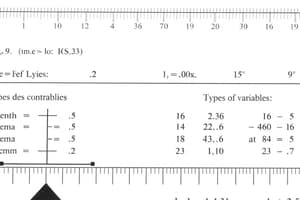Podcast
Questions and Answers
Which of the following best describes statistics in the singular sense?
Which of the following best describes statistics in the singular sense?
- A science that deals with techniques for collecting, presenting, analyzing, and drawing conclusions from data (correct)
- Numerical descriptions by which understanding of data is enhanced
- Measurements that are only numerical values
- Measurements that are only categories
What is an example of a qualitative variable?
What is an example of a qualitative variable?
- Height
- Civil status (correct)
- Weight
- Temperature
Which of the following is an example of a continuous variable?
Which of the following is an example of a continuous variable?
- Height
- Civil status
- Number of people per municipality
- Weight (correct)
What is a discrete variable typically restricted to?
What is a discrete variable typically restricted to?
Which scale of measurement is represented by nominal scale?
Which scale of measurement is represented by nominal scale?
What type of data do qualitative studies rely on?
What type of data do qualitative studies rely on?
What type of data do quantitative studies rely on?
What type of data do quantitative studies rely on?
Which type of study collects non-numerical data?
Which type of study collects non-numerical data?
What is the main difference between qualitative and quantitative studies?
What is the main difference between qualitative and quantitative studies?
What can awareness of qualitative and quantitative approaches help researchers with?
What can awareness of qualitative and quantitative approaches help researchers with?
Flashcards
What is statistics?
What is statistics?
A science focused on collecting, organizing, analyzing, and drawing conclusions from data.
What is a qualitative variable?
What is a qualitative variable?
A variable that describes characteristics using words or categories, not numbers.
What is a continuous variable?
What is a continuous variable?
A variable that can take on any value within a range, often represented by decimals.
What is a discrete variable?
What is a discrete variable?
Signup and view all the flashcards
What is Nominal scale?
What is Nominal scale?
Signup and view all the flashcards
What are qualitative studies?
What are qualitative studies?
Signup and view all the flashcards
What are quantitative studies?
What are quantitative studies?
Signup and view all the flashcards
What is the difference between qualitative and quantitative studies?
What is the difference between qualitative and quantitative studies?
Signup and view all the flashcards
How does knowing about qualitative and quantitative approaches help researchers?
How does knowing about qualitative and quantitative approaches help researchers?
Signup and view all the flashcards
Study Notes
Understanding Statistics and Variables
- Statistics, in the singular sense, refers to the science of data collection, analysis, interpretation, presentation, and organization.
- Qualitative variables represent categories or qualities. An example is the type of car owned (e.g., sedan, SUV, truck).
- Continuous variables can take any value within a given range. An example is height, measured in centimeters.
- Discrete variables are typically restricted to specific values, often whole numbers. An example includes the number of students in a classroom.
Scales of Measurement
- The nominal scale is the simplest scale of measurement, used for labeling variables without a quantitative value, such as gender or religion.
Data Types in Research
- Qualitative studies rely on non-numerical data, focusing on understanding concepts, thoughts, or experiences.
- Quantitative studies rely on numerical data, which can be measured and analyzed statistically.
Types of Studies and Their Focus
- Non-numerical data is primarily collected in qualitative studies, aiming for an in-depth understanding rather than quantification.
- The main difference between qualitative and quantitative studies lies in their focus: qualitative studies seek to explore and interpret phenomena, whereas quantitative studies aim to quantify and analyze data patterns and relationships.
Importance of Research Approaches
- Awareness of qualitative and quantitative approaches can help researchers choose appropriate methodologies, enhance data collection strategies, and improve overall study design.
Studying That Suits You
Use AI to generate personalized quizzes and flashcards to suit your learning preferences.
Description
Test your knowledge of statistics and quantitative variables with this quiz! Learn about the techniques used in collecting and analyzing data, and enhance your understanding of numerical descriptions. Challenge yourself with questions on weight, height, and more!




